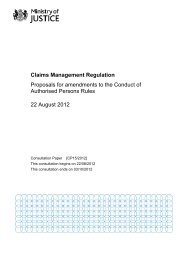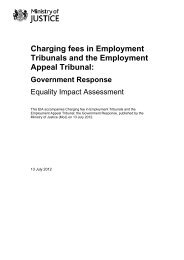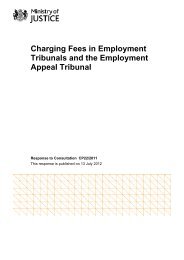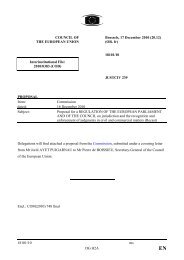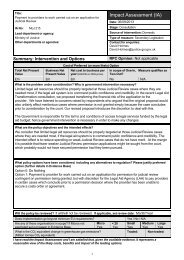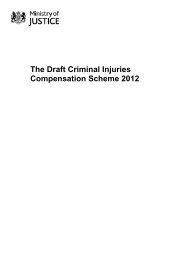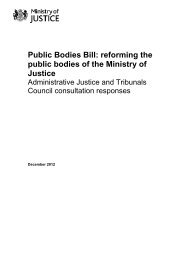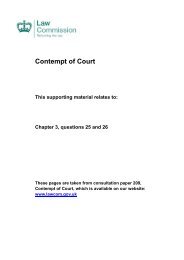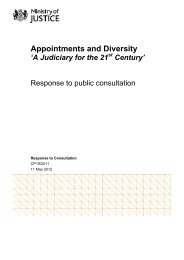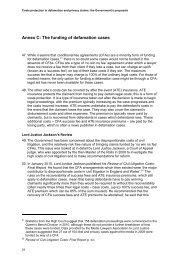Proposed reforms to attachment of earnings orders - Ministry of Justice
Proposed reforms to attachment of earnings orders - Ministry of Justice
Proposed reforms to attachment of earnings orders - Ministry of Justice
You also want an ePaper? Increase the reach of your titles
YUMPU automatically turns print PDFs into web optimized ePapers that Google loves.
- The volume <strong>of</strong> <strong>orders</strong> <strong>to</strong> obtain information is assumed <strong>to</strong> fall as <strong>orders</strong> <strong>to</strong> obtain information<br />
would not be needed when an AEO fails if the information could be obtained by HMRC<br />
instead. However this reduction in workload might not be as large if the baseline volume <strong>of</strong><br />
initial AEOs was higher. Indeed given the benefits <strong>to</strong> credi<strong>to</strong>rs, it is possible that initial case<br />
volumes might rise.<br />
- Court fees are assumed <strong>to</strong> remain the same. The reduction in court case volumes is<br />
assumed not <strong>to</strong> have a significant material impact on overall court cost recovery.<br />
- Court capacity (including staff and estate) is assumed not <strong>to</strong> be affected by these<br />
proposals.<br />
- The existing extent <strong>of</strong> non-compliance with AEOs is assumed <strong>to</strong> remain the same.<br />
- Obtaining information from HMRC is assumed <strong>to</strong> be less costly and quicker than securing<br />
an order <strong>to</strong> obtain information from HMCS. We assume that ongoing costs <strong>of</strong> operating this<br />
linkage will be secured by fee income.<br />
- Legal pr<strong>of</strong>essions are assumed <strong>to</strong> incur one-<strong>of</strong>f adjustment costs from their changing<br />
pattern <strong>of</strong> demand but are assumed <strong>to</strong> incur no change in ongoing costs or income once<br />
they have adjusted <strong>to</strong> undertaking less AEO related business and more other business.<br />
- We have assumed that the overall impact on legal aid, if any, is unlikely <strong>to</strong> be significant<br />
3. Enforcement, Sanction and Moni<strong>to</strong>ring<br />
3.1 The responsibility <strong>of</strong> enforcing a judgment debt remains the judgment credi<strong>to</strong>rs. Action on failure<br />
<strong>to</strong> comply with a court-based enforcement method by a judgment deb<strong>to</strong>r, is a matter for the<br />
credi<strong>to</strong>r should they wish <strong>to</strong> continue pursuing recovery <strong>of</strong> a particular judgement debt. With<br />
regard <strong>to</strong> AEOs, compliance would remain the responsibility <strong>of</strong> employers bound <strong>to</strong> make<br />
deductions in accordance with the provisions <strong>of</strong> the section 6 <strong>of</strong> the Attachment <strong>of</strong> Earnings Act<br />
1971. As <strong>to</strong> compliance for finding the deb<strong>to</strong>r’s employer, where information is requested from<br />
HMRC service-level standards would be established between Her Majesty’s Court Service and<br />
HMRC. MoJ will moni<strong>to</strong>r the impact <strong>of</strong> the court-based enforcement methods once they are<br />
implemented. There is a criminal sanction under these provisions for persons who use and<br />
disclose information obtained from HMRC for a purpose that is not connected with an <strong>attachment</strong><br />
<strong>of</strong> <strong>earnings</strong> order.<br />
4. Specific Impact Tests<br />
1) Statu<strong>to</strong>ry equality duties<br />
4.1 An Equalities Impact Assessment signed <strong>of</strong>f by the Direc<strong>to</strong>r (Nick Goodwin) is annexed.<br />
2) Economic impacts<br />
i) Competition<br />
4.2 The proposals may have an impact on competition <strong>to</strong> the extent that some employers may<br />
already possess the IT systems required and others might not. The latter might be subject <strong>to</strong> a<br />
competitive disadvantage as a result <strong>of</strong> the proposals.<br />
ii) Small firms<br />
4.3 The proposals may be relatively more burdensome on small employers, especially those who do<br />
not already possess the new IT systems required. It may be that smaller firms are less likely <strong>to</strong><br />
possess this IT.<br />
4.4 AEOs are likely <strong>to</strong> affect small firms which are credi<strong>to</strong>rs as they are not applicable <strong>to</strong> firms which<br />
are deb<strong>to</strong>rs. As such the <strong>reforms</strong> may be <strong>of</strong> benefit <strong>to</strong> small firms.<br />
3) Environmental impacts<br />
16



